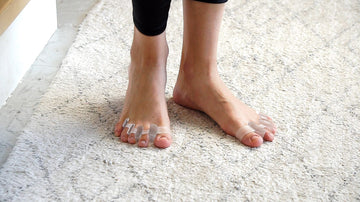Effective Treatments for Plantar Fasciitis: Relief for Your Aching Feet
by Emily Jannet on Mar 27, 2024
Plantar fasciitis is a common foot condition that affects millions of people worldwide. It manifests as pain and inflammation in the thick band of tissue (the plantar fascia) that runs across the bottom of your foot, connecting your heel bone to your toes. The pain is often most pronounced with the first steps in the morning or after long periods of rest. Fortunately, there are several treatments available to help alleviate the discomfort and promote healing. In this article, we'll explore some of the most effective treatments for plantar fasciitis, including the use of ankle sleeves.
-
Rest and Ice
One of the first steps in treating plantar fasciitis is to rest the affected foot and apply ice to reduce inflammation. Rest allows the damaged tissue to heal, while icing can help alleviate pain and swelling. Applying ice to the affected area for 15-20 minutes several times a day can provide significant relief.
-
Stretching and Strengthening Exercises
Stretching and strengthening exercises can help improve the flexibility and strength of the muscles and ligaments in the foot and ankle, which can reduce strain on the plantar fascia. Simple exercises like calf stretches, toe curls, and towel scrunches can be effective in relieving pain and preventing further injury.
-
Orthotic Inserts
Orthotic inserts, such as arch supports or heel cups, can provide additional support and cushioning to the foot, reducing pressure on the plantar fascia. These inserts can be purchased over-the-counter or custom-made by a podiatrist to fit your specific foot shape and needs. Wearing supportive shoes with adequate arch support is also important in managing plantar fasciitis.
-
Night Splints
Night splints are devices worn while sleeping that keep the foot in a dorsiflexed position, stretching the plantar fascia and Achilles tendon overnight. This prolonged stretch can help alleviate morning pain and stiffness by preventing the plantar fascia from tightening up during sleep.
-
Physical Therapy
Physical therapy can be beneficial for individuals with plantar fasciitis by providing targeted exercises and treatments to improve flexibility, strength, and mobility in the foot and ankle. A physical therapist can also perform techniques such as massage, ultrasound therapy, and taping to reduce pain and inflammation.
-
Extracorporeal Shock Wave Therapy (ESWT)
Extracorporeal shock wave therapy is a non-invasive treatment that uses shock waves to stimulate healing in damaged tissue. It has been shown to be effective in reducing pain and improving function in patients with chronic plantar fasciitis who have not responded to other treatments. ESWT is typically performed as an outpatient procedure and may require multiple sessions for optimal results.
-
Corticosteroid Injections
Corticosteroid injections can provide short-term relief from pain and inflammation in severe cases of plantar fasciitis. However, they should be used sparingly and under the guidance of a healthcare professional, as repeated injections can weaken the plantar fascia and increase the risk of complications.
-
Ankle Sleeves
Ankle sleeves, also known as compression sleeves or socks, can be an effective adjunctive treatment for plantar fasciitis. These sleeves provide gentle compression to the foot and ankle, which can help improve circulation, reduce swelling, and provide support to the arch of the foot. Additionally, ankle sleeves can help stabilize the ankle joint and promote proper alignment, which may alleviate strain on the plantar fascia.
When choosing an ankle sleeve for plantar fasciitis, look for one that provides adequate compression and support without being too restrictive. It should be comfortable to wear for extended periods and made from breathable, moisture-wicking materials to prevent overheating and discomfort.
Plantar fasciitis can be a debilitating condition that affects your daily activities and quality of life. However, with the right combination of treatments and therapies, relief is possible. Whether you opt for rest and ice, stretching exercises, orthotic inserts, or more advanced treatments like shock wave therapy, the key is to be proactive in managing your symptoms and addressing the underlying causes of your pain. Ankle sleeves can also play a valuable role in your treatment plan by providing support, stability, and compression to help alleviate discomfort and promote healing. Remember to consult with a healthcare professional for personalized advice and guidance on the best treatment options for your individual needs. With patience and persistence, you can overcome plantar fasciitis and get back to enjoying life on your feet.





